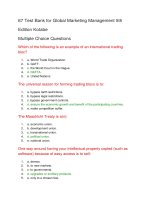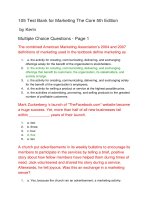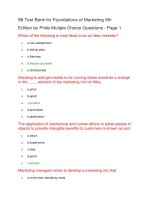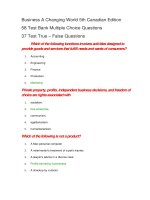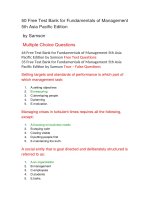Test bank focus on personal finance 5th 5e jack kapoor ch01
Bạn đang xem bản rút gọn của tài liệu. Xem và tải ngay bản đầy đủ của tài liệu tại đây (306.04 KB, 186 trang )
Chapter 01
Personal Financial Planning in Action
True / False Questions
1. Personal financial planning is the process of managing your money to achieve
personal economic satisfaction.
True
False
2. A financial plan is an informal report that analyzes past financial decisions.
True
False
3. A financial plan can only be created using a money management software package.
True
False
4.
Financial Plans are only created by financial planners.
True
False
5.
The life situation of a household includes a combination of personal factors such as
age, income, household size, and personal beliefs.
True
False
6.
The financial activities for a young, single person will probably be the same as those
for an older couple with no dependent children at home.
True
False
7. Inflation is most harmful to people with incomes expected to increase.
True
False
1-1
Copyright © 2016 McGraw-Hill Education. All rights reserved. No reproduction or distribution without the prior written consent of
McGraw-Hill Education.
8.
Inflation is a rise in the general level of prices and it, reduces the buying power of the
dollar.
True
False
9.
When prices are increasing at a rate of 4 percent, the cost of products would double
in about 18 years.
True
False
10.
As borrowing by consumers and businesses increases, interest rates are likely to
decrease.
True
False
11.
Planned spending through budgeting is part of the "spending" component of financial
planning activities.
True
False
12. Retirement planning includes thinking about your housing situation, recreational
activities, and possible volunteer or part-time work.
True
False
13. Short-term goals are usually achieved within the next year or so.
True
False
14. Intermediate goals are usually achieved within the next year or so.
True
False
15.
Purchasing an appliance is an example of a consumable-product goal.
True
False
1-2
Copyright © 2016 McGraw-Hill Education. All rights reserved. No reproduction or distribution without the prior written consent of
McGraw-Hill Education.
16. Purchasing a car is an example of a durable-product goal.
True
False
17. Opportunity costs refer to money already spent.
True
False
18.
Personal opportunity costs refer to resources, such as time, health, and energy, that
are given up when a choice is made.
True
False
19.
Interest earned is calculated by multiplying the principal times the time value of
money.
True
False
20.
Risks associated with many financial decisions are easy to identify and evaluate.
True
False
21.
$500 on deposit at 6% for 6 months would earn $20.
True
False
22.
There are only 3 methods of calculating time value of money.
True
False
23.
There are only 3 possible courses of action when developing alternatives for decision
making.
True
False
1-3
Copyright © 2016 McGraw-Hill Education. All rights reserved. No reproduction or distribution without the prior written consent of
McGraw-Hill Education.
Multiple Choice Questions
24.
A formalized report that summarizes your current financial situation, analyzes your
financial needs, and recommends future financial activities is a(n)
A.
B.
C.
D.
E.
Insurance prospectus.
Investment forecas
25.
The major function of personal financial planning is to
A.
B.
C.
Achieve personal economic satisfaction.
D.
E.
Improve your credit rating.
Obtain adequate insurance protection.
26.
An advantage of effective personal financial planning is:
A.
B.
C.
D.
E.
The use of low-interest savings
Increased impulse spending
Increased control of financial affairs
More credit card debt
Less monitoring of investments
1-4
Copyright © 2016 McGraw-Hill Education. All rights reserved. No reproduction or distribution without the prior written consent of
McGraw-Hill Education.
27.
The stages in the family situation and financial needs of an adult is called the
A.
B.
C.
D.
E.
Financial planning process
Budgeting procedure
Personal economic cycle
Tax planning process
28.
Jim Johnson was laid off from his job two months ago. He just received an offer for a
position that pays 3/4 the salary of his old job. Why should he set up a financial plan?
A.
B.
C.
D.
To increase the effectiveness of obtaining, using, and protecting his financial reso
To decrease control of his financial affairs regarding debt.
To accept the loss of freedom from financial worries due to his new position.
To learn how to manage depending more on others.
E.
To find out why he was laid off.
29.
The consumer price index measures:
A.
The prices of goods and services in the United States
B.
The prices of goods and services in Bolivia
C.
The average change in prices of goods and services of urban consumers
D.
The change in prices of goods and services around the world
E.
1-5
Copyright © 2016 McGraw-Hill Education. All rights reserved. No reproduction or distribution without the prior written consent of
McGraw-Hill Education.
None of the abo
30. The actual cost of living increase for a household will be:
A.
B.
C.
D.
E.
Greater than the inflation rate as reported by the CPI since the index excludes the
Lower than the inflation rate as reported by the CPI since the index excludes the p
Equal to the inflation rate as reported by the CPI since it includes all products and
Either greater than or less than the inflation rate as reported by the CPI dependin
Zero since the CPI does not measure consumer price changes
31. The Rule of 72 is:
A.
B.
A tool to determine the number of years until retirement for an employee
Used to estimate how fast prices will double using a given annual inflation rate
C.
D.
E.
The legal code for requiring companies to provide a match on retirement savin
Used to calculate interest rates for savings
The number of steps required to complete a financial plan
32. Who is less likely to be harmed by inflation?
A.
B.
C.
D.
Fixed income consumers
E.
Financial regulators
33.
Increased consumer saving and investing is likely to be accompanied by
A.
B.
Lower union wages
Higher interest rates
C.
D.
Lower production costs
Lower interest rat
E.
1-6
Copyright © 2016 McGraw-Hill Education. All rights reserved. No reproduction or distribution without the prior written consent of
McGraw-Hill Education.
34.
A savor or an investor should expect to receive a risk premium for
A.
Higher interest rates
B.
C.
D.
Lower consumer prices
Higher uncertainty about getting his/her money back
Reduced credit ratings
E.
Expected lower inflation
35. Which of the following would increase the interest rate for a loan?
A.
B.
C.
Higher down payment
Expected lower inflation
D.
E.
Lower consumer prices
Short time to maturity
36. Patrick Guitman recently graduated from college with $20,000 in student loans and
$5,000 in credit card debt. He usually makes minimum payments on his debt and he
has been late with three payments in the last year. He wants to buy a new car but
was told that his interest rate on a loan would be very high. What is the most likely
reason this might be so?
A.
B.
General interest rates are very low
His credit rating is poor which results in a higher interest rate
C.
D.
E.
He already has a student loan outstanding
Recent graduates are not allowed to have more than $25,000 in debt outstand
Interest rates must be tied to the CPI
1-7
Copyright © 2016 McGraw-Hill Education. All rights reserved. No reproduction or distribution without the prior written consent of
McGraw-Hill Education.
37.
Attempts to increase income through employment are part of the _____________
component of financial planning.
A.
B.
C.
D.
E.
38.
The ‘borrowing' component in a financial plan relates to
A.
B.
C.
D.
E.
Acquiring adequate insurance coverage
Investing for long-term growth
Setting up a bud
Obtaining financial resources from employment, investments or ownership
Maintaining control over credit-buying habits
39.
The problem of bankruptcy is associated with overuse and misuse of credit in the
______________ component of financial planning.
A.
B.
C.
D.
E.
1-8
Copyright © 2016 McGraw-Hill Education. All rights reserved. No reproduction or distribution without the prior written consent of
McGraw-Hill Education.
40.
The saving component of financial planning focuses on long-term security and
includes:
A.
A regular savings plan for emergencies
B.
C.
Bankruptcy counseling
D.
A realistic budget for your current financial situation
E.
Minimizing transportation expenses through careful planning
41. Which of the following short-term goals is stated most clearly using the SMART
approach?
A.
B.
C.
D.
E.
Buy a car for less than $15,000 within 6 months
Retire in 10 years at age 65 with $2,000,000 in my 401(k) account
Purchase a house with a mortgage no greater than $150,000 within 5 years
Set up an emergency fund
Invest $50 per month for the next 12 years for my nephew's college fund
42. Which of the following long-term goals is stated most clearly using the SMART
approach?
A.
B.
C.
D.
E.
Buy a car for less than $15,000 within 6 months
Retire in 10 years at age 65
Purchase a house with a mortgage no greater than $150,000 within 5 years
Set up an emergency fund
Invest $50 per month for the next 12 years for my nephew's college fund
1-9
Copyright © 2016 McGraw-Hill Education. All rights reserved. No reproduction or distribution without the prior written consent of
McGraw-Hill Education.
43. Which of the following intermediate goals is stated most clearly using the SMART
approach?
A.
B.
C.
D.
E.
Buy a car for less than $15,000 within 6 months
Retire in 10 years at age 65 with $2,000,000 in my 401(k) account
Purchase a house with a mortgage no greater than $150,000 within 5 years
Set up an emergency fund
Invest $50 per month for the next 12 years for my nephew's college fund
44. Which of the following goals would be the easiest to implement and measure?
A.
B.
C.
D.
E.
Put money into an investment fund.
Reduce credit card debt.
Save funds for an annual vacation.
Save $100 a month to create a $2,400 emergency fund in 2 years.
Spend less each month.
45. The goal of investing $50 per month for the next 12 years for your nephew's college
fund is a(n) __________ goal.
A.
B.
C.
D.
E.
46. Many Americans have money problems because of
A.
B.
C.
D.
E.
Poor planning and weak money management habits
Too many clearly defined goals
Proper use of cred
Not enough advertising to make effective decisions
Controlled spending
47. Susan Smith has a goal of "saving $25 per month for a TV". Considering the SMART
approach, Susan’s goal lacks
A.
B.
C.
D.
E.
A realistic perspective
An action-orientation
A specific objec
1-10
Copyright © 2016 McGraw-Hill Education. All rights reserved. No reproduction or distribution without the prior written consent of
McGraw-Hill Education.
48. Which of the following is correct?
A.
B.
C.
D.
E.
A car purchase is a consumable-product goal
Entertainment is a durable-product goal
Appliances and sporting equipment are intangible-purchase goals
Leisure and education are durable-product goals
Food and clothing are consumable-product goals
49. _________ goals relate to infrequently purchased, expensive items.
A.
B.
C.
D.
E.
Intangible-purchase
Consumable-products
50. To develop financial goals, one should
A.
B.
C.
D.
E.
Set several general goals for the short-term
Only set long-term goals after short-term goals have been accomplished
Focus on intermediate goals first
Identify specific, realistic goals that are measurable along with a time frame and
Not worry about whether or not the goals can be achieved based on one's income
51. The goal of purchasing a long-term care insurance policy would be most appropriate
for
A.
B.
C.
D.
E.
A young couple without children.
A single parent with a preschool daughter.
An unmarried couple without children.
An older single person with children.
A young single individual.
52. Opportunity cost refers to
A.
B.
C.
D.
E.
Money needed for major consumer purchases.
The trade-off of a decision.
The amount paid for taxes when a purchase is made.
Current interest rates.
Evaluating different alternatives for financial decisions.
1-11
Copyright © 2016 McGraw-Hill Education. All rights reserved. No reproduction or distribution without the prior written consent of
McGraw-Hill Education.
53. Robert Brown is interested in attending a concert next weekend. Unfortunately, he is
scheduled to work. If he finds a substitute for his shift so he can attend the concert,
what kind of cost is he incurring?
A.
B.
C.
D.
E.
Personal opportunity cost relating to health
Personal opportunity cost relating to time
Personal opportunity cost relating to abilities
Personal opportunity cost relating to knowledge
Unexpected personal opportunity cost
54. Which of the following is an example of a financial opportunity cost?
A.
B.
C.
D.
E.
Renting an apartment near school
Saving money instead of spending it today
Organizing income tax records
Purchasing automobile insurance
Using a personal computer for financial planning
55. An example of a personal opportunity cost would be
A.
B.
C.
D.
E.
Interest lost by using savings to make a purchase.
Higher earnings on savings that must be kept on deposit a minimum of six mon
Lost wages due to continuing as a full-time student.
Time comparing several brands of personal computers.
Having to pay a tax penalty due to not having enough withheld from your month
56. The time value of money refers to
A.
B.
C.
D.
E.
Personal opportunity costs such as time lost on an activity.
Financial decisions that require borrowing funds from a financial institution.
Changes in interest rates due to changes in the supply and demand for money in
Increases in an amount of money as a result of interest earned.
Changing demographic trends in our society.
57. If I can invest a dollar today and earn interest on it, then it should be worth _________
in the future.
A.
B.
C.
D.
E.
Either less or the same as
Either the same as or more
1-12
Copyright © 2016 McGraw-Hill Education. All rights reserved. No reproduction or distribution without the prior written consent of
McGraw-Hill Education.
58. To calculate the time value of money, we need to consider all of the following except
the
A.
B.
C.
D.
E.
Amount of the savings.
Annual interest rate.
Length of time the money is on deposit.
Type of investme
59. Future value computations are often referred to as
A.
B.
C.
D.
E.
60. Present value computations are also referred to as
A.
B.
C.
D.
E.
61. Steve Wilson wants to deposit $150 per month into an account earning 4 percent for
the next 3 years, so he can purchase a used car at that time. What type of
computation would he use to determine the amount he will have for his purchase?
A.
B.
C.
D.
E.
Present value of a single amount
Future value of a single amount
Present value of an annuity
Future value of an annuity
62. Rhonda Miller wants to take out a 4 year loan to purchase a car. What type of
computation would she use to calculate her monthly payments?
A.
B.
C.
D.
E.
Present value of a single amount
Future value of a single amount
Present value of an annuity
Future value of an annuity
1-13
Copyright © 2016 McGraw-Hill Education. All rights reserved. No reproduction or distribution without the prior written consent of
McGraw-Hill Education.
63. Tim Taylor received a $500 gift from his grandparents. He wants to invest this money
for the down payment of a house that he plans to purchase in 3 years. What type of
computation should he use?
A.
B.
C.
D.
E.
Present value of a single amount
Future value of a single amount
Present value of an annuity
Future value of an annuity
64. Jennifer Rodriguez plans to attend graduate school in 5 years. She thinks that she will
need a total of $32,000 to pay for school, and she wants to save money each month
to reach her goal. What type of computation should she use?
A.
B.
C.
D.
E.
Present value of a single amount
Future value of a single amount
Present value of an annuity
Future value of an annuity
65. Paul Davis wants to deposit money today for a vacation that he plans to take to Asia
after he graduates from Graduate School. Which formula should he use to determine
the amount of money he will have available for his vacation?
A.
B.
C.
D.
E.
Present value of a single amount
Future value of a single amount
Present value of an annuity
Future value of an annuity
66. The first step of the financial planning process is to
A.
B.
C.
D.
E.
Develop financial goals.
Implement the financial plan.
Determine your current financial situation.
Evaluate and revise the financial plan..
Create a financial action plan.
67. Making financial decisions related to income involves all of the following except
A.
B.
C.
D.
E.
All of these are financial decisions
1-14
Copyright © 2016 McGraw-Hill Education. All rights reserved. No reproduction or distribution without the prior written consent of
McGraw-Hill Education.
68. Place the following steps for a personal financial plan in the proper order:
1.
2.
3.
4.
5.
6.
Review and revise the financial plan
Identify alternative courses of action
Create and implement your financial action plan
Determine your current financial situation
Evaluate alternatives
Develop your financial goals
A.
B.
C.
D.
E.
69. Every decision involves uncertainty, which is referred to as
A.
B.
C.
D.
E.
Consequences of choices.
Alternative courses of action.
70. Changes in the cost of money is referred to as ____________ risk.
A.
B.
C.
D.
E.
71. The rising or falling of prices that causes changes in buying power is referred to as
____________ risk.
A.
B.
C.
D.
E.
72. The loss of a job or encountering an illness results in ____________ risk.
A.
B.
C.
D.
E.
1-15
Copyright © 2016 McGraw-Hill Education. All rights reserved. No reproduction or distribution without the prior written consent of
McGraw-Hill Education.
73. The tangible and intangible factors that create a less than desirable situation is
referred to as ____________ risk.
A.
B.
C.
D.
E.
74.
The difficulty of converting savings and investments to cash is referred to as
____________ risk.
A.
B.
C.
D.
E.
75.
Changes in personal, social, and economic factors may require you to
A.
Review and revise your financial plan more frequently.
B.
Implement your financial action plan.
C.
Develop your financial goals.
D.
Determine current financial situation.
E.
Create your financial plan of action.
1-16
Copyright © 2016 McGraw-Hill Education. All rights reserved. No reproduction or distribution without the prior written consent of
McGraw-Hill Education.
76. The step in the personal financial planning process that follows "Create and
implement your financial action plan" is
A.
Review and revise the financial plan
B.
C.
Identify alternative courses of action
Determine current financial situation
D.
Evaluate alternatives
E.
Develop your financial goals
77.
Using the services of financial institutions or financial specialists (such as insurance
agents or investment advisers) to seek relevant information is done in which step in
the financial planning process?
A.
Develop your financial goals.
B.
Review and revise your financial plan.
C.
Determine your current financial situation.
D.
Evaluate your alternatives.
E.
Create your financial plan of action.
78. If inflation is expected to be 8 percent, how long will it take for prices to double?
A.
B.
C.
D.
E.
1-17
Copyright © 2016 McGraw-Hill Education. All rights reserved. No reproduction or distribution without the prior written consent of
McGraw-Hill Education.
79. If a $10,000 investment earns interest of $500 in one year, what is its rate of return?
A.
B.
C.
D.
E.
80. If a $10,000 investment earns a 4 % annual return, what should its value be after one
year?
A.
B.
C.
D.
E.
81. If a $10,000 investment earns a 7% annual return, what should its value be after 6
years?
A.
B.
C.
D.
E.
82. If Melinda Miller estimates that her $100 weekly grocery bill will increase at an annual
inflation rate of 4%, what should her weekly grocery bill be in 3 years?
A.
B.
C.
D.
E.
83. Annual earnings on a $500 Certificate of Deposit earning 3% would be
A.
B.
C.
D.
E.
1-18
Copyright © 2016 McGraw-Hill Education. All rights reserved. No reproduction or distribution without the prior written consent of
McGraw-Hill Education.
84. Randy Hill wants to retire in 20 years with $1,000,000. If he can earn 10% per year
on his investments, how much does he need to deposit each year to reach his goal?
Round your answer to the nearest dollar.
A.
B.
C.
D.
E.
None of the abo
85. If you begin saving $2,000 a year at 5% (from age 22 to age 30 or 9 years), what will
these funds grow to in this time period?
A.
B.
C.
D.
E.
86. If you want $1,000 three years from now and you earn 4 percent on your savings,
how much do you need to deposit?
A.
B.
C.
D.
E.
1-19
Copyright © 2016 McGraw-Hill Education. All rights reserved. No reproduction or distribution without the prior written consent of
McGraw-Hill Education.
Chapter 01 Personal Financial Planning in Action Answer
Answer Key
True / False Questions
1.
(p. 3)
Personal financial planning is the process of managing your money to achieve
personal economic satisfaction.
TRUE
Definition
Blooms: Remember
Difficulty: 1 Easy
Learning Objective: 01-01 Identify social and economic influences on personal financial goals and decisions.
Topic: Financial Planning
2.
A financial plan is an informal report that analyzes past financial decisions.
(p. 4)
FALSE
A financial plan is a formal report that summarizes your current financial situation,
analyzes financial needs, and recommends future financial activities.
Blooms: Remember
Difficulty: 1 Easy
Learning Objective: 01-01 Identify social and economic influences on personal financial goals and decisions.
Topic: Financial Planning
3.
(p. 4)
A financial plan can only be created using a money management software
package.
FALSE
A financial plan can be created on your own, or you can seek assistance from a
financial planner, or use a money management software package.
Blooms: Remember
Difficulty: 2 Medium
Learning Objective: 01-01 Identify social and economic influences on personal financial goals and decisions.
Topic: Financial Planning
1-20
Copyright © 2016 McGraw-Hill Education. All rights reserved. No reproduction or distribution without the prior written consent of
McGraw-Hill Education.
4.
(p. 4)
Financial Plans are only created by financial planners.
FALSE
Financial plans are created by individuals as well as by financial planners or by
using a money management software package.
Blooms: Remember
Difficulty: 1 Easy
Learning Objective: 01-01 Identify social and economic influences on personal financial goals and decisions.
Topic: Financial Planning
5.
(p. 5)
The life situation of a household includes a combination of personal factors such as
age, income, household size, and personal beliefs.
TRUE
Blooms: Understand
Difficulty: 2 Medium
Learning Objective: 01-01 Identify social and economic influences on personal financial goals and decisions.
Topic: Financial Planning
6.
(p. 5)
The financial activities for a young, single person will probably be the same as
those for an older couple with no dependent children at home.
FALSE
In Exhibit 1-1, specialized financial activities differ for a young, single versus an
older couple without children.
Blooms: Understand
Difficulty: 2 Medium
Learning Objective: 01-01 Identify social and economic influences on personal financial goals and decisions.
Topic: Financial Planning
1-21
Copyright © 2016 McGraw-Hill Education. All rights reserved. No reproduction or distribution without the prior written consent of
McGraw-Hill Education.
7.
Inflation is most harmful to people with incomes expected to increase.
(p. 6)
FALSE
Inflation is most harmful to people with fixed incomes.
Blooms: Remember
Difficulty: 1 Easy
Learning Objective: 01-01 Identify social and economic influences on personal financial goals and decisions.
Topic: Finance and Economics
Topic: Financial Planning
8.
(p. 6)
Inflation is a rise in the general level of prices and it, reduces the buying power of
the dollar.
TRUE
Blooms: Remember
Difficulty: 1 Easy
Learning Objective: 01-01 Identify social and economic influences on personal financial goals and decisions.
Topic: Finance and Economics
Topic: Financial Planning
9.
(p. 6)
When prices are increasing at a rate of 4 percent, the cost of products would
double in about 18 years.
TRUE
Use the Rule of 72: (72/4 = 18 years).
Blooms: Apply
Difficulty: 2 Medium
Learning Objective: 01-01 Identify social and economic influences on personal financial goals and decisions.
Topic: Finance and Economics
Topic: Financial Planning
10.
(p. 7)
As borrowing by consumers and businesses increases, interest rates are likely to
decrease.
FALSE
Blooms: Understand
1-22
Copyright © 2016 McGraw-Hill Education. All rights reserved. No reproduction or distribution without the prior written consent of
McGraw-Hill Education.
Difficulty: 2 Medium
Learning Objective: 01-01 Identify social and economic influences on personal financial goals and decisions.
Topic: Finance and Economics
Topic: Financial Planning
11.
(p. 7)
Planned spending through budgeting is part of the "spending" component of
financial planning activities.
FALSE
It is part of the "planning" activity.
Blooms: Understand
Difficulty: 1 Easy
Learning Objective: 01-01 Identify social and economic influences on personal financial goals and decisions.
Topic: Financial Planning
12.
(p. 8)
Retirement planning includes thinking about your housing situation, recreational
activities, and possible volunteer or part-time work.
TRUE
Blooms: Remember
Difficulty: 1 Easy
Learning Objective: 01-01 Identify social and economic influences on personal financial goals and decisions.
Topic: Financial Planning
13.
Short-term goals are usually achieved within the next year or so.
(p. 9)
TRUE
Blooms: Remember
Difficulty: 1 Easy
Learning Objective: 01-02 Develop personal financial goals.
Topic: Financial Planning
14.
Intermediate goals are usually achieved within the next year or so.
(p. 9)
FALSE
Intermediate goals have a time frame of 2 to 5 years.
Blooms: Remember
Difficulty: 1 Easy
Learning Objective: 01-02 Develop personal financial goals.
Topic: Financial Planning
1-23
Copyright © 2016 McGraw-Hill Education. All rights reserved. No reproduction or distribution without the prior written consent of
McGraw-Hill Education.
15.
(p. 9)
Purchasing an appliance is an example of a consumable-product goal.
FALSE
Purchasing an appliance is a durable-product goal.
Blooms: Understand
Difficulty: 1 Easy
Learning Objective: 01-02 Develop personal financial goals.
Topic: Financial Planning
16.
Purchasing a car is an example of a durable-product goal.
(p. 9)
TRUE
Blooms: Understand
Difficulty: 1 Easy
Learning Objective: 01-02 Develop personal financial goals.
Topic: Financial Planning
17.
Opportunity costs refer to money already spent.
(p. 11)
FALSE
An opportunity cost is what a person gives up when a choice is made.
Blooms: Remember
Difficulty: 2 Medium
Learning Objective: 01-03 Calculate time value of money situations associated with personal financial
decisions.
Topic: Time Value of Money
18.
(p. 11)
Personal opportunity costs refer to resources, such as time, health, and energy,
that are given up when a choice is made.
TRUE
Blooms: Understand
Difficulty: 2 Medium
Learning Objective: 01-03 Calculate time value of money situations associated with personal financial
decisions.
Topic: Time Value of Money
1-24
Copyright © 2016 McGraw-Hill Education. All rights reserved. No reproduction or distribution without the prior written consent of
McGraw-Hill Education.
19.
(p. 11)
Interest earned is calculated by multiplying the principal times the time value of
money.
FALSE
Interest earned = principal (amount in savings) × annual interest rate × time
period.
Blooms: Understand
Difficulty: 2 Medium
Learning Objective: 01-03 Calculate time value of money situations associated with personal financial
decisions.
Topic: Time Value of Money
20.
(p. 18)
Risks associated with many financial decisions are easy to identify and evaluate.
FALSE
These risks are difficult to identify and evaluate.
Blooms: Understand
Difficulty: 2 Medium
Learning Objective: 01-04 Implement a plan for making personal financial and career decisions.
Topic: Financial Planning
21.
(p. 11)
$500 on deposit at 6% for 6 months would earn $20.
FALSE
$500 × 0.06 × 6mo/12mo = $15 interest earned
Blooms: Apply
Difficulty: 3 Hard
Learning Objective: 01-03 Calculate time value of money situations associated with personal financial
decisions.
Topic: Time Value of Money
1-25
Copyright © 2016 McGraw-Hill Education. All rights reserved. No reproduction or distribution without the prior written consent of
McGraw-Hill Education.

